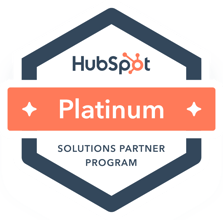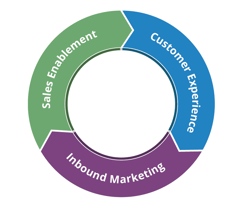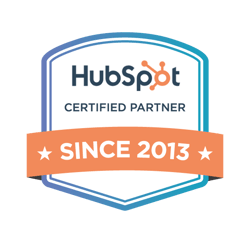 Last week, I was fortunate enough to attend #INBOUND14 in Boston with the rest of our Prism Global Marketing team. With marketers, authors, philanthropists, and many more from around the world, I was able to hear numerous people talk about marketing in their area of expertise. I left feeling inspired, and ready to make a change. Here are 4 lessons I learned from the awesome keynote speakers at #INBOUND14.
Last week, I was fortunate enough to attend #INBOUND14 in Boston with the rest of our Prism Global Marketing team. With marketers, authors, philanthropists, and many more from around the world, I was able to hear numerous people talk about marketing in their area of expertise. I left feeling inspired, and ready to make a change. Here are 4 lessons I learned from the awesome keynote speakers at #INBOUND14.
1. “People don’t buy what you do, they buy why you do it.” - Simon Sinek
As an inbound marketer, you’re continuously developing and nurturing relationships with your current customers and prospects. By providing valuable and unique content, you’re communicating with them in a way they can appreciate. Simon discussed communication heavily in his keynote as he spoke about really listening to others (whether they are clients, prospects or employees), and giving their ideas true consideration. With inbound marketing, it’s crucial to take the time to understand what the consumer is asking for, and why they are asking for it.
The message of discovering your “why” as a marketer is equally important. This message was spread throughout Simon’s keynote as he also presented the content from his newest book, “Leaders Eat Last.” He boiled down leadership to the human behavior of caveman saying that, “As a leader, one’s job is to solely look after the people of the organization, and the people will look after the work.” This relates directly to the inbound marketing industry since the work we do is always revolving around what people want and need. To learn more about Simon’s Sinek and the books he’s written on communication and leadership, view both of his TedTalks.
2. "Transformative innovators have a sense of urgency...they're not willing to wait to change the world." - Malcolm Gladwell
Malcom Gladwell’s keynote was both inspiring and thought-provoking as he shared the stories of three entrepreneurs who have changed the course of history including: Malcolm McLean, the man who created today’s modern shipping container, Ingvar Kamprad, Founder of IKEA, and Steve Jobs, Apple’s late CEO. Gladwell said that among other defining traits, all three individuals weren’t necessarily smarter than their opponents (although still very intelligent), but they simply just had a stronger “sense of urgency” and “weren’t willing to wait to change the world."
The inbound methodology is innovative and transformative in itself. I nbound marketing has changed the way marketers look at the industry and has created a more efficient understanding of the buyer’s journey. With a sense of urgency, and an understanding that marketing was headed in a different direction, HubSpot changed this industry, and a transformative change, at that.
3."Marketing boils down to providing unique value." - Guy Kawasaki
Guy Kawasaki was the very first keynote speaker at #INBOUND14 delivering, “The Lesson’s I Learned from Steve Jobs.” This impressive keynote was full of brilliant advice and insights into the business and marketing world. The one lesson I felt was most valuable was that, "marketing boils down to providing unique value.” Kawasaki gave the vision of a two-by-two matrix. The vertical axis measures how the product you’re selling differs from competitors, and the horizontal axis measures your product’s value. Where do you want to be? The top right corner – where you can say that your product is both incomparably unique and highly different from any of your competitors. Inbound marketing revolves around that uniqueness, differentiating the content to fit the customer, not the other way around. Here are the 12 lessons Guy Kawasaki learned from Steve Jobs.
4. "People shop and learn in a whole new way compared to just a few years ago, so marketers need to adapt or risk extinction." - Brian Halligan, Co-Founder and CEO, HubSpot
During Brian Halligan and fellow Co-Founder and CTO of HubSpot Dharmesh Shah’s Keynote, the pair released HubSpot’s new CRM and Sales Sidekick as well as nine other marketing product updates including:
- Anonymous Personalization
- Editorial Calendar
- Attribution Reporting
- Revenue Reporting
- Email Optimization
- List Analytics
- Branching Logic in Workflows
- Tally
- Internationalized Product
I was also able to discover more about HubSpot within the various sessions led by HubSpot employees. When attending a session about the use of smart content, I learned that marketers can appeal to their aduiences by better distinguishing their content. Smart content is defined by HubSpot as “website content that changes based on the interests or past behavior of the viewer” and is successful in helping marketers in several ways:
- Promotes great user experience
- Personalizes messaging to the user
- Increases conversion
Smart content is based on the lifecycle stages of the buyer, or the persona of the buyer, and is orchestrated towards the buyer’s journey. It is another type of content “update” which will allow us to better succeed as inbound marketers. With smart content, you must start small and as you work through the process, you will find what fits, and eventually create a greater change for both you, your company, and your customers.
#INBOUND14 was not an ordinary conference where people arrived in the morning, heard what they needed to hear, and then left feeling semi-informed. #INBOUND14 set out to gather a community of savvy inbound marketers, inspire them, and give them the tools and inspiration needed to help them create remarkable outcomes.








.png?width=250&name=diamond-badge-color%20(1).png)
